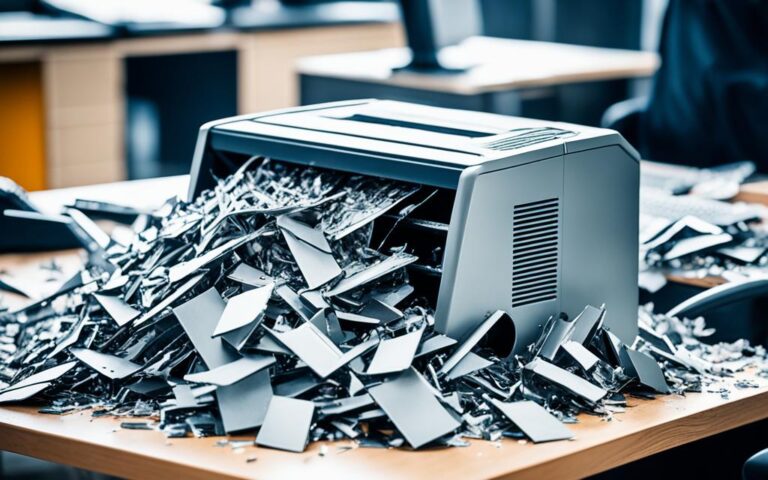Addressing the Unique Data Destruction Needs of Small Businesses
Data protection laws require small businesses to securely destroy personal data when it’s no longer needed. This article explores practical methods for destroying physical and digital data, ensuring compliance with data protection regulations. Whether it’s shredding paper documents or securely deleting digital information, small businesses need to have a plan in place for the secure destruction of data.
Small businesses often handle sensitive customer information and must take appropriate measures to protect it. Failure to do so can result in legal consequences, damage to reputation, and potential financial loss. Therefore, understanding and addressing the specific data destruction needs of small businesses is crucial.
When it comes to small business data needs, it’s important to recognize that data goes beyond just physical documents. Digital data, such as customer records, financial information, or sensitive emails, also require secure destruction to safeguard against unauthorized access or data breaches.
In the following sections, we will discuss different methods for securely destroying both physical and digital data. By implementing these strategies, small businesses can maintain compliance with data protection regulations and protect the privacy of their customers and clients.
Destroying Paper Documents Permanently and Securely
Shredding is a common and cost-effective method for small businesses to securely destroy paper documents. Whether you have an in-house shredder or hire a professional shredding service, it’s essential to ensure the complete eradication of any sensitive information from the paper. Proper disposal, such as recycling, is also crucial to maintain environmental responsibility.
When it comes to paper document destruction, following best practices is key. Take inspiration from Jasmine, the owner of a small high street retail shop. Jasmine diligently shreds customer records after the retention period, ensuring the security of her business and customer data.
Shredding Services vs. In-House Shredding
Small businesses have two options for paper document destruction – utilizing a shredding service or conducting shredding in-house. Each approach comes with its own advantages and considerations:
| Shredding Service | In-House Shredding |
|---|---|
| Convenient and time-efficient | Provides complete control over the process |
| Can handle large volumes of documents | Cost-effective for lower document volumes |
| Ensures professional handling and disposal | Requires maintenance and upkeep of shredding equipment |
| Offers documented proof of destruction | Requires staff training on handling and security protocols |
By analyzing their paper document destruction needs, small businesses can choose the most suitable method for their operations. It’s important to prioritize the secure disposal of paper documents to protect sensitive information and comply with data protection regulations.
Now let’s take a moment to delve into the steps involved in effectively shredding paper documents:
- Document Preparation: Remove any staples, paper clips, or bindings from the documents to ensure smooth shredding.
- Shredding Process: Feed the paper documents into the shredder, ensuring they are shredded thoroughly and in a way that makes reconstruction impossible.
- Quality Assurance: Periodically check the shredded paper to ensure no readable fragments remain, guaranteeing the secure destruction of data.
- Proper Disposal: Dispose of the shredded documents responsibly, such as through recycling or engaging a trusted waste management service to ensure environmental sustainability.
By following these steps, small businesses can effectively and securely destroy their paper documents, mitigating the risk of data breaches and protecting sensitive information.
Next, we’ll explore the crucial aspect of deleting digital information and backups to ensure comprehensive data destruction and security for small businesses.
Deleting Digital Information and Backups
When it comes to digital data, small businesses need to be aware that deleting data from devices doesn’t necessarily mean it’s permanently erased. Electronic systems may have backups or background storage that can still hold onto data even after deletion.
It’s advisable to use secure deletion software that overwrites data multiple times or seek specialist IT advice for proper data deletion. This ensures that sensitive information cannot be recovered from storage devices. Small businesses like Helen’s financial advice firm can securely delete client records from her work laptop by using specialized software to remove data not only from the device itself but also from the recycle bin and email sent items.
Here’s a practical example:
Helen, the owner of a small financial advice firm, takes data privacy seriously. She understands the importance of securely deleting client records from her work laptop. Helen uses advanced data deletion software to overwrite the files multiple times, making them irretrievable. Additionally, she ensures that the deleted data is removed from the recycle bin and email sent items. By taking these measures, Helen effectively protects her clients’ sensitive information and safeguards her business’s reputation.
Benefits of Secure Deletion Software:
- Irreversibly removes data from storage devices
- Prevents unauthorized access and data breaches
- Demonstrates compliance with data protection regulations
- Protects sensitive information and preserves privacy
By implementing secure deletion practices, small businesses can rest assured that their digital data is permanently eradicated, reducing the risk of unauthorized access and potential data breaches.
The Importance of Secure Data Backups:
While it’s crucial to securely delete data, it’s equally important for small businesses to have efficient data backup strategies in place. Regularly backing up files not only protects against data loss due to hardware failure, malware attacks, or accidental deletion but also ensures business continuity.
Key Considerations for Data Backup:
- Automate backup processes to avoid human errors and ensure consistency
- Store backups in secure locations, such as encrypted external drives or reputable cloud storage services
- Regularly test the integrity and accessibility of backup files to ensure they can be successfully restored if needed
- Consider implementing off-site backups for added protection against physical damage or disasters
By combining secure deletion practices with reliable data backup procedures, small businesses can effectively manage their digital data, protect sensitive information, and maintain compliance with data protection regulations.
Checking Contracts and Secure Data Processors
When small businesses hire data processors to handle their sensitive data, it is crucial to ensure that these processors have the necessary credentials and secure processes in place. Small businesses should prioritize the evaluation of data processors to guarantee the secure deletion of their data. This can be achieved by:
- Conducting Due Diligence: Before entering into any agreements or contracts, small businesses should thoroughly research and vet potential data processors. This involves checking their track record, reputation, and compliance with data protection regulations. Just as Zoe, owner of a boutique marketing agency, conducts extensive background checks on data processors before granting them access to her clients’ personal data.
- Ensuring Contractual Obligations: It is essential to have a comprehensive and legally binding contract in place with data processors. This contract should clearly outline the terms and conditions of the data processing arrangement, including the obligation to securely destroy data. John, owner of an online retail store, ensures that all contracts mandate secure data destruction and establishes protocols for data retention and deletion.
By selecting reputable and trusted data processors, small businesses can have confidence that their data will be handled and destroyed securely. This not only protects the business and its customers but also ensures compliance with data protection laws. It is crucial for small businesses to prioritize the security of their data throughout the entire data processing lifecycle.
Data Processor Evaluation Checklist
Here is a checklist to consider when assessing data processors:
| Criteria | Description |
|---|---|
| Experience and Expertise | Assess the data processor’s industry experience and expertise in handling sensitive data. |
| Compliance with Regulations | Ensure that the data processor complies with relevant data protection regulations, such as the General Data Protection Regulation (GDPR). |
| Security Measures | Verify the data processor’s security measures, including encryption, access control, and staff training. |
| Data Handling and Destruction Processes | Evaluate the data processor’s procedures for handling and securely destroying data to prevent unauthorized access or accidental breaches. |
By carefully evaluating data processors against these criteria, small businesses can make informed decisions and ensure the security of their data throughout its lifecycle. By choosing the right data processors and establishing robust contractual agreements, small businesses can mitigate the risks associated with data processing and protect the confidentiality, integrity, and availability of their sensitive information.
Importance of Data Destruction for Small Businesses
Data destruction plays a crucial role in safeguarding sensitive information, ensuring compliance with data protection regulations, and optimizing operational costs for small businesses. By prioritizing secure data disposal, small businesses can protect their reputation, reduce the risk of data breaches, practice environmental responsibility, and contribute to a sustainable business environment.
One of the key benefits of data destruction is protecting sensitive information from falling into the wrong hands. Small businesses often handle personal and financial data of their clients, employees, and stakeholders. Failing to securely dispose of this data can lead to identity theft, fraud, and reputational damage. Therefore, implementing robust data destruction practices is vital to maintain the trust of customers and stakeholders.
In addition, compliance with data protection regulations is critical for small businesses. The General Data Protection Regulation (GDPR) in the UK mandates that personal data should not be retained for longer than necessary. Properly destroying data after its useful life ensures compliance with GDPR and helps small businesses avoid penalties and legal consequences.
“Small businesses must recognize the importance of secure data destruction as part of their overall data protection strategy. It is not enough to focus on data security during storage and transmission; data destruction is equally important to prevent unauthorized access and maintain compliance.”
Data breaches can cripple small businesses financially and harm their reputation. Securely disposing of confidential data significantly reduces the risk of data breaches. By implementing methods like shredding and recycling, small businesses can effectively eliminate the vulnerabilities associated with keeping obsolete or unnecessary data.
Practicing environmental responsibility is another vital aspect of data destruction for small businesses. By securely disposing of data through proper recycling methods, small businesses can minimize their ecological footprint and contribute to a sustainable business environment. Sustainable data destruction services like server recycling offered by IT Recycle UK enable small businesses to address their specific data destruction needs while minimizing their impact on the environment.
To summarize the importance of data destruction, it not only protects sensitive information and ensures legal compliance but also helps small businesses maintain trust, reduce the risk of data breaches, and promote environmental responsibility. By prioritizing secure data disposal, small businesses can safeguard their operations and contribute to a safer, more sustainable business landscape.
Small Business Data Destruction Best Practices
- Implement a data destruction policy that outlines proper procedures for destroying both physical and digital data.
- Train employees on data protection measures and the importance of secure data destruction.
- Use secure shredding services or invest in high-quality shredders to eliminate identifying information from paper documents.
- Utilize secure deletion software or seek professional IT expertise to ensure proper disposal of digital information.
- Establish contracts with trusted and reputable data processors, ensuring secure data destruction services are in place.
- Regularly review and update data destruction practices to stay aligned with evolving data protection regulations.
Comparative Analysis of Data Destruction Methods
| Data Destruction Method | Benefits | Limitations |
|---|---|---|
| Physical Shredding | Effective in destroying paper documents | May not be suitable for digital data |
| Secure Deletion Software | Can permanently erase digital information | Requires technical expertise to ensure proper usage |
| Professional Data Destruction Services | Comprehensive and secure disposal of both physical and digital data | Associated costs for outsourcing the destruction process |
Conclusion
In conclusion, small businesses must prioritize addressing their unique data destruction needs to ensure compliance with data protection laws and protect sensitive information. By implementing proper methods for destroying both physical and digital data, small businesses can effectively minimize the risk of data breaches and maintain the trust of their customers.
It is crucial for small businesses to have secure processes in place, such as shredding paper documents and securely deleting digital information. Additionally, it is important to check contracts with data processors to ensure they prioritize secure data destruction and have appropriate credentials and processes in place.
With bespoke data destruction solutions, small businesses can effectively manage their data and ensure compliance with UK data protection regulations. By prioritizing the secure disposal of data, small businesses can safeguard their reputation, reduce the likelihood of data breaches, and contribute to a sustainable environment.
FAQ
What are the data destruction needs of small businesses?
Small businesses need to securely destroy personal data to comply with data protection laws and protect sensitive information.
How can small businesses destroy paper documents securely?
Small businesses can use a shredder within their office or hire a shredding service to securely destroy paper documents.
What should small businesses do to ensure secure paper document destruction?
Small businesses should ensure that the shredder leaves no identifiable information on the paper and properly dispose of the shredded documents, such as through recycling.
How can small businesses delete digital information effectively?
Small businesses should use secure deletion software that overwrites data multiple times or seek specialist IT advice for proper data deletion.
What potential issue do small businesses face when deleting digital data from devices?
Deleting data from devices doesn’t necessarily mean it’s permanently erased, as electronic systems may have backups or background storage that can still hold onto data.
What should small businesses do to ensure secure data deletion?
Small businesses should delete data from recycle bins and email sent items, remove data from devices following specialist advice, and use secure deletion software.
How can small businesses ensure secure data destruction when hiring data processors?
Small businesses should check the credentials and processes of data processors they hire and have a contract in place that ensures secure data destruction.
Why is data destruction important for small businesses?
Data destruction is important for small businesses to protect sensitive information, comply with data protection regulations, prevent data breaches, and optimize operational costs.
How can small businesses benefit from comprehensive data destruction services?
Comprehensive data destruction services can help small businesses address their specific data destruction needs, such as server recycling, and ensure compliance with UK data protection regulations.
What are the key takeaways for small businesses regarding data destruction?
Small businesses should address their unique data destruction needs, implement proper methods for destroying physical and digital data, check contracts with data processors, and prioritize secure data disposal.















